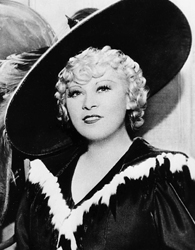Comic actress and playwright Mae West was known for her bold sensuality, clever one-liners and resurrection of Paramount Studios. She was the first actress to control her own scripts. Knowing her sexy dialogue would rankle Hollywood censors, West left in offensive snippets for them to slash, allowing double entendres to tiptoe past. Not everyone approved, but many enjoyed watching a brassy bombshell speak her mind. “I never set out to make men a career,” she once remarked. “It just happened that way.”
Mae West’s Early Days
Mary Jane West was born August 17, 1893, in Brooklyn, New York, to boxer and livery stable owner John “Battlin’ Jack” West and Matilda “Tillie” Delker-Doelger, a corset model and unsuccessful actress. She began entering talent contests at age five as “Baby Mae.”
At age 12, she was performing in vaudeville as “Baby Vamp,” and introducing audiences to the sexy dance move known as the shimmy by age 18. In 1911, West debuted on Broadway with the revue “A la Broadway and Hello, Paris.” For the next 15 years, she performed both on Broadway and in vaudeville as a dancer and singer.
Sources in this Story
- NNDB: Mae West
- Encyclopedia Britannica: Mae West
- New York Magazine: Mae West “Sex” Capade
- Turner Classic Movies: She Done Him Wrong
- Turner Classic Movies: Biography for Mae West
- Time: She Was What She Was
- The New York Times: Mae West, Stage and Movie Star Who Burlesqued Sex, Dies at 87
West’s Film Career
In 1926, West wrote and performed in a play called “Sex,” playing a hooker. The popular play was raided, and West and the cast arrested. West bailed the cast out, and refused to close the show. She sentenced to 10 days in jail, and was paid $1,000 for an interview when she got out. According to New York Magazine, she used that money to open a library at the women’s prison where she had been held.
In 1932, she appeared in her first Hollywood film, “Night After Night.” It was followed by “She Done Him Wrong,” adapted from her Broadway play, “Diamond Lil,” and which included several memorable lines, such as “Is that a gun in your pocket, or are you just happy to see me?”
The movie helped Paramount, which had been near bankruptcy, and also helped make Cary Grant a star.
By 1935, she was the second highest-paid actor in the country. She made several films during the 1930s and 40s, including “I’m No Angel” (1933), “Klondike Annie” (1936) and “My Little Chickadee (1940), which also starred W.C. Fields. After 1943’s “The Heat’s On,” West’s film career went on hiatus until the 1970s.
The Woman and Her Work
- “Three Plays by Mae West: Sex, The Drag and Pleasure Man”
- “Mae West: It Ain’t No Sin,” by Simon Louvish
- “When I’m Bad, I’m Better: Mae West, Sex, and American Entertainment,” by Marybeth Hamilton
- “Mae West: The Glamour Collection” (DVD)
- “She Done Him Wrong” (DVD)
The Rest of the Story
West’s last films, “Myra Breckenridge” (1970) and “Sextette” (1978), weren’t well received. Time magazine’s obituary noted, “Mae could not comprehend that anyone would find it odd to see a woman her age being romanced by men half a century younger.”
In her later years, she remained obliviously narcissistic, telling interviewers, “I look the way I did when I was 22.” West died on November 22, 1980, following complications from a stroke she suffered three months earlier.
This article was originally written by Shannon Firth; it was updated July 18, 2017.











